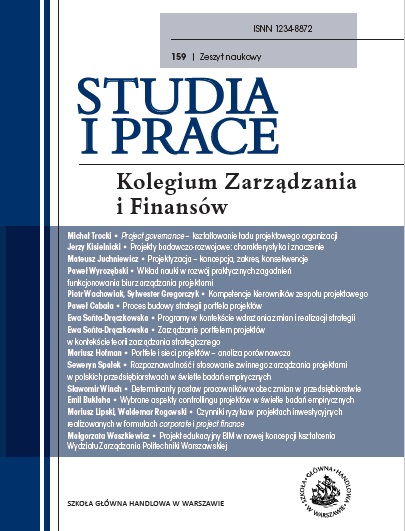Contribution of Science to the Development and Evolution of Project Management Offices
Keywords:
PMO, project management office, project management, project organisationAbstract
In the 1990 s the concept of project organisation evolved towards project management offices, which began to appear within the organisation structures of a growing number of organisations. At that time, most studies on PMOs came from the environment of consultants and business experts. The PMO-related problems were not systematically researched and developed on the basis of proven and broadly recognised scientific knowledge. The criticism of the work done by consultants and practitioners promoting the PMO implementation in organisations was voiced by a team headed by B. Hobbs and M. Aubrey. The article presents their scientific path of cognition of the PMO phenomenon. Their example presents a real value and contribution of science to the development the practical area of project management. It may also inspire to deliberations on the relation of individual and scientific cognition in management sciences.
Downloads
References
2. Aubry M., Hobbs B., Thuillier D., Organisational Project Management: An Historical Approach to the Study of PMOs, „International Journal of Project Management” 2008, 26(1).
3. Aubry M., Müller R., Glückler J., Governance and Communities of PMOs, Newtown Square 2012.
4. Aubry M., Müller R., Hobbs B., Blomquist T., Project Management Offices in Transition, „International Journal of Project Management” 2010, 28.
5. Aubry M., Richter M.C., Lavoie-Tremblay M., Cyr G., Pluralism in PMO Performance: The Case of a PMO Dedicated to a Major Organizational Transformation, „Project Management Journal” 2011, vol. 42, no. 6.
6. Bell B., B. Bell’s essays on agriculture, „The British Critic” 1805, vol. 25–26, no. 1.
7. Casey W., Peck W., Choosing the Right PMO Setup, „PM Network” 2001, 48 (15/2).
8. Crawford J.K., The Strategic Project Office. A Guide to Improving Organizational Performance, CRC Press, New York 2002.
9. Darling E.J., Whitty S.J., The Project Management Office: It’s Just Not What it Used to Be, „International Journal of Managing Projects in Business” 2016, vol. 9, no. 2.
10. Englund R.L., Graham R.J., Dinsmore P.C., Creating the Project Office. A Manager’s Guide to Leading Organizational Change, Jossey-Bass, San Francisco 2003.
11. Hallows J.E., The Project Management Office Toolkit. A Step-by-Step Guide to Setting up a Project Management Office, AMACOM, New York 2002.
12. Hill G.M., Evolving the Project Management Office: A Competency Continuum, „Information Systems Management” 2004, 21(4).
13. Hill G.M., The Complete Project Management Office Handbook, 2 ed., Auerbach Publications, Boca Raton 2008.
14. Hobbs B., The Multi-Project PMO: A Global Analysis of the Current State of Practice, A White Paper Prepared for Project Management Institute, Newtown Square 2007.
15. Hobbs B., Aubry M., A Multi-Phase Research Program Investigating Project Management Offices (PMOs). The Results of Phase I, „Project Management Journal” 2007, 38(1).
16. Hobbs B., Aubry M., An Empirically Grounded Search for a Typology of Project Management Offices, „Project Management Journal” 2008, 39(1).
17. Hobbs B., Aubry M., The Project Management Office or PMO: A Quest for Understanding, Project Management Institute, Newtown Square 2010.
18. Kendall G.I., Rollins S.C., Advanced Project Portfolio Management and the PMO, Multiplying ROI at Warp Speed, J. Ross Pub., Ft. Lauderdale 2003.
19. Müller R., Glückler J., Aubry M., A Relational Typology of Project Management Offices, „Project Management Journal” 2013, 44(1).
20. Pemsel S., Wiewiora A., Project Management Office a Knowledge Broker in Project-Based Organisations, „International Journal of Project Management” 2013, 31/1.
21. Rad P.F., Levin G., The Advanced Project Management Office. A Comprehensive Look at Function And Implementation, CRC Press, Boca Raton 2002.









